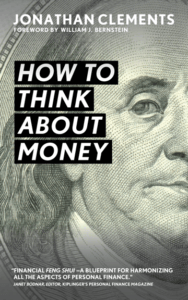Jonathan Clements's Blog, page 355
August 14, 2019
Works If You Can’t
BE HONEST: When was the last time you thought about disability insurance? As co-founder of a website that sells insurance, it���s a topic I think about every day, but I realize most folks have other things on their mind. Yet becoming disabled is one of the biggest financial risks that working people face.
Disability can result from accidents or sickness and can impact people of all ages. According to the Social Security Administration, a 20-year-old entering the workforce has a one-in-four chance of becoming disabled for a year or more before retirement. That���s four times the probability of death, plus the financial consequences are far worse. After all, you���re still alive���which means you still have living expenses. When you become disabled, you not only lose your earning potential, but also you likely face steep medical and other bills.
Long-term disability insurance helps protect workers from this risk. But in the U.S., only a third of workers have coverage. The good news is, if you work at a larger company or have an office job, you���re much more likely to have coverage. The bad news is, your coverage may still not be enough. Most group coverage���that is, coverage you get through work���has percentage and dollar caps on benefits.
For instance, if you become disabled, you might receive 60% of your income up to a maximum $5,000 per month. Let���s say you make more than $100,000 per year. The $5,000 per month cap means you���re protecting less than 60% of your income, plus your group disability benefits would be taxable. If you aren���t careful, you can quickly get into a situation where disability benefits are not enough to cover your living expenses, let alone medical bills, retirement savings, college savings and other important financial goals.
Think Social Security���s disability program will protect you? Unfortunately, that���s unlikely. Social Security requires you not only to have a disability that���s expected to last more than a year, but also the disability must prevent you from all work. If you���re able to work just a few hours a week or you’re expected to recover within 12 months, you don���t qualify. In addition, benefits are limited: $1,170 was the average monthly benefit paid in 2017. Finally, even if you do qualify, it could take a year or more to get approved. More than half of applicants get denied.
So how do you protect yourself? An individual disability policy can help. But you might be surprised that���even though my site sells individual policies���I recommend them as a last resort, because individual policies are relatively expensive and they���re one of the more complicated insurance products. They also take six to eight weeks to get, because insurers must underwrite both your health and financial situation. Before you go down that route, consider the following four steps:
Understand your work coverage.��How is disability defined? What benefits do you receive and for how long? If you were to become disabled, would the benefits be enough to live on, especially after figuring in taxes? If your work coverage is enough, you probably don���t need to look elsewhere.
Explore buying additional group coverage through work.��Some companies pay for 60% income coverage but allow employees to pay a small amount to bump that up to 66.7% or 70%. If this is available, it���s a great option, because it���s relatively affordable and usually doesn���t require medical underwriting.
Explore buying individual coverage through work. Some employers negotiate deals with insurers, so employees can purchase individual disability policies at a discount. Because of group buying power and the fact that insurers can aggregate a potentially large pool of customers, these policies will often be cheaper than buying a policy on your own. In some cases, the insurer even simplifies the underwriting process, so no medical exams are required. The great part about these policies is you can take them with you if you change employers, which is not the case with your group coverage.
Explore affinity group discounts.��If you belong to an affinity group���such as an association for lawyers or accountants���see if your group offers disability insurance at a discount. If not, ask if the group is open to adding a discount program. Many insurers will offer a discount of 5% to 15% on individual disability insurance if you can get the affinity group on the insurance company���s ���approved��� list. The main requirement is that the affinity group needs a couple of years of history and cannot be set up solely for the purpose of buying insurance. You���ll likely need someone from the affinity group to provide information to the insurer, but it should be a simple process.
Assuming you don���t have any long-term disability insurance coverage, or you have insufficient coverage and can���t get more from the above sources, you likely need an individual policy. In a future post, I���ll cover the ins and outs of how these policies work and how to select the right one for you.
 Dennis Ho is a life actuary and chief executive of Saturday Insurance, a digital insurance advisor that helps people shop for income annuities, long-term-care insurance and other insurance products. Prior to co-founding Saturday, Dennis spent 20 years in the insurance industry in a variety of actuarial, finance and business roles. His previous article for HumbleDollar was Bet Your Life. Dennis can be reached at dennis@saturdayinsurance.com��or��via LinkedIn.
Dennis Ho is a life actuary and chief executive of Saturday Insurance, a digital insurance advisor that helps people shop for income annuities, long-term-care insurance and other insurance products. Prior to co-founding Saturday, Dennis spent 20 years in the insurance industry in a variety of actuarial, finance and business roles. His previous article for HumbleDollar was Bet Your Life. Dennis can be reached at dennis@saturdayinsurance.com��or��via LinkedIn.
The post Works If You Can’t appeared first on HumbleDollar.
August 13, 2019
Matter of Degree
YES, EDUCATION is invaluable. But should young adults go to college to obtain a piece of paper that may mean little in the real world? Is the student debt we hear so much about really worth it? Could pushing college attendance for all be as misguided as pushing homeownership for all?
I���m not against formal education. I put four children through college. In fact, I believe parents are obligated to cover their children���s college costs, assuming they have the financial wherewithal to do so. That doesn���t mean they should pay college costs at the expense of retirement savings���but it may mean delaying the purchase of a new RV. Parents also have a duty to guide their 18-year-old���s college decision. I don���t see a child turning 18 as the signal that parents are done parenting.
I also believe we need to expand how we define education, which���in my view���doesn���t begin and end in the classroom. I learned a great deal about the Second World War from visiting the Normandy Beaches and Auschwitz, and about the Middle East from seeing the living conditions in the West Bank and listening to residents. I learn every day by reading, usually two or three books at a time.
My contention: We need to question why it takes four years���and often more���to get a bachelor���s degree, why college is priced as it is and perhaps how we fund those degrees considered important to society. Clearly, you need a rigorous course of study for a professional degree. But if you aren���t aiming to become, say, a doctor, dentist, architect or lawyer, it strikes me we need an educational system with greater flexibility.
Many European students finish their degrees in three years by focusing on their majors. General education, like writing skills and critical thinking, are learned in high school.
By contrast, in the U.S., many students enter college unprepared and are placed in remedial classes, thereby paying a steep price for basic education that should have been learned long before college. Why are we surprised that, lacking parental guidance, students often burden themselves with unaffordable debt, in part by taking low value courses which could be considered a luxury? Patients who don���t follow the doctor���s instructions, or fail to take medication, get little value for their money. A student not focused on his or her education likewise gets little value from college.
The U.S. ranks just 16th among developed countries in literacy. The statistics on reading skills are shocking and have a direct impact not only on college, but also on our citizens��� ability to function effectively in today���s society.
I question assumptions like higher cost equals higher quality. That a four-year model fits all. That any degree provides value. That having a degree guarantees a better job, more income, better life decisions and greater success���however that���s defined.
And what about the cost of higher education? I randomly picked the University of the Pacific, a private nonprofit school I���ve never heard of. Tuition��is $49,688. The full cost is $68,784. But 90% of students receive financial aid and the net cost is about half the sticker price. So what���s the true cost? It���s similar to health care. The billed price is unrelated to the real price.
From 2000 to 2019, the average health care inflation rate was 3.4% annually. College tuition increased at an average inflation rate of 5.14%��over the same period. Why do we scream about the former and yet don���t question the latter? Instead of looking at the cost structure of colleges, including the money spent on administration, buildings and so on, we focus only on the debt needed to pay for it.
Rhetoric about student loans looks at symptoms and not causes. Generous loans may even contribute to the high cost and the time spent in school���again, not unlike health care and health insurance. It seems to me that, if college loans are to be made, they need to come with conditions that ensure the money is efficiently and effectively spent, both by the student and the institution.
Following one���s dream is fine. But when it comes to selecting a college major and incurring thousands in debt, there���s a practical aspect as well. The job and income prospects matter. Not all majors are equal. In fact, some are declining in demand.
There are good reasons insurance companies and governments monitor, evaluate and sometimes limit what they pay for health care. Why should college be any different? As with health care, we have been seduced into accepting that cost equals quality and that more is better.
Insurance premiums are not the fundamental problem with health care costs���and student loans are not the fundamental problem with college. In both cases, the issue is what���s charged for what we consume���and the way we consume it.
 Richard Quinn blogs at QuinnsCommentary.com. Before retiring in 2010, Dick was a compensation and benefits executive. His previous articles include Lesson Unlearned,��Making It Work��and��Righting Wrongs.��Follow Dick on Twitter��@QuinnsComments.
Richard Quinn blogs at QuinnsCommentary.com. Before retiring in 2010, Dick was a compensation and benefits executive. His previous articles include Lesson Unlearned,��Making It Work��and��Righting Wrongs.��Follow Dick on Twitter��@QuinnsComments.
Do you enjoy��reading the articles by Dick and HumbleDollar’s other writers? Please support our work with a��donation.
The post Matter of Degree appeared first on HumbleDollar.
August 12, 2019
Think Bigger
FOR MUCH of my adult life, my view of financial planning was similar to that of many others: Simply put, financial planning equaled investment management.
I spent my career in aerospace engineering, surrounded by highly educated, mathematically competent colleagues. I was lucky enough to span the transition from defined benefit pension plans to defined contribution plans. My colleagues and I closely followed the market���s performance, our own company���s shares and emerging tech stocks. Some of the more mathematically inclined dabbled in options. Outside of work, one of my brothers and I ran an investment club. It was amazing to watch stock prices rise for companies that never made a profit.
Despite all these financial conversations during my early adult life, I don���t remember any substantive discussion of estate planning, insurance, taxes or health care. All that changed in my late 30s. My parents��� health problems turned into financial problems. My brothers and I provided increasing support.
Eventually, my wife and I sold our home, bought my parents’ place and combined families. Declining health required adaptations to the house, fighting with Medicare, and understanding and accommodating hospice. My aging in-laws also compelled us to deal with issues like declining cognition, powers of attorney, taking over financial responsibility, finding lost assets, simplifying portfolios, finding quality and affordable senior living, and settling multiple estates.
All this fired my interest in the broader aspects of financial planning. I wanted to be prepared as my wife and I approached retirement. I became an expert on my company���s defined benefit and defined contribution programs, and even provided counseling to fellow employees. I passed the exam to become a CFP, or certified financial planner, and then completed the RICP���retirement income certified professional���program. I volunteered and trained for the IRS���s Volunteer Income Tax Assistance program, helping diverse clients complete their tax returns. I���ve learned so much from the many practitioners I met along the way���financial planners, estate attorneys, health care professionals, senior care professionals and tax preparers.
This journey has led me to a deeper understanding of the value and real need for financial planning. Most of my friends and colleagues are near or at retirement age. Many are perfect clients for holistic financial planning, but don���t know about it or won���t accept it. When they consult me now, I ask more probing questions about estate planning, tax planning and retirement income plans. Preparing tax returns for people of modest wealth has been eye-opening. The growth of defined contribution plans has led to widespread concerns that the average family is not prepared to manage and draw down what���s often their largest asset.
What have I learned along the way? Here are just six of the lessons:
Regularly saving money creates positive momentum in your financial life. Nothing is more important.
A simple, diversified, high-quality, low-cost portfolio is often all you need.
Spend less time following the market and more time understanding your taxes. Even if someone else prepares your tax returns, be sure to review them and understand your situation.
Check that your estate plan is in good shape, with beneficiaries named, an up-to-date will and powers of attorney. Have a list of financial accounts available for your executor.
If you have parents, talk with them about their finances. Make sure their estate is in order.
Develop a family balance sheet showing your assets and debts, as well as a cash flow statement listing your income sources and where the money goes. Update these annually and review them with your family. Each year, you���ll see the impact of saving and investing���and that���ll spur you to improve your finances even further.
 Richard Connor is��
a semi-retired aerospace engineer with a keen interest in finance.
Rick enjoys a wide variety of other interests, including chasing grandkids, space, sports, travel, winemaking and reading.��Follow Rick on Twitter��@RConnor609.
Richard Connor is��
a semi-retired aerospace engineer with a keen interest in finance.
Rick enjoys a wide variety of other interests, including chasing grandkids, space, sports, travel, winemaking and reading.��Follow Rick on Twitter��@RConnor609.
Do enjoy articles by Rick and HumbleDollar’s other contributors? Please support our work with a donation.
The post Think Bigger appeared first on HumbleDollar.
August 11, 2019
Never Mind
WHEN IT COMES to your financial life, should you care what other people think?
I���ve always found this a tricky question. On the one hand, it���s easy to fall into the trap of keeping up with the Joneses. If you care too much about what other people think, life can become very expensive���and that can be detrimental to your financial health.
On the other hand, it���s also natural to want to be accepted by one���s peers. No one wants to operate��too far��outside societal norms. Yes, you can march to the beat of your own drum, but if you���re too far out of step with your peers, that can make life hard in other ways. In short, you don���t want to care too much about others��� opinions, but you also don���t want to care too little. This can be a difficult balance to strike.��
In their book��The Millionaire Next Door, authors Thomas Stanley and William Danko offered one solution: Simply choose a different peer group. To avoid judgment from wealthy neighbors, they argued, move to another neighborhood. While I suppose that might work, this always struck me as impractical. If my neighbor drives a Mercedes, do I have to pull my children out of school and leave town just to avoid the temptation to buy���or lease���one myself? That, I think, rings hollow as a solution.
But there���s another way to strike a healthy balance���which is to associate with the Joneses, without feeling like you need to keep up with them financially. About two decades ago, psychologist Thomas Gilovich and colleagues discovered something they dubbed the ���spotlight effect.��� What they found is that the rest of the world is paying much less attention to you than you think they are.
How did they prove this? In a series of��experiments, the researchers outfitted college students in a variety of T-shirts and then sent them out into social situations on campus. Some students were given shirts carrying pictures of popular icons, including Jerry Seinfeld, Bob Marley and Martin Luther King, while others were given shirts carrying an image of singer Barry Manilow, designed to be intentionally embarrassing.
Before they entered the social situations, the students wearing the Barry Manilow shirts were asked to estimate how many of their peers would notice their shirts. Then, some time later, the researchers polled the other students to find out how many had��actually��noticed the embarrassing shirts. Result: There was a wide gap between students��� expectations of how they would be perceived and how they were actually perceived. Those wearing the Barry Manilow shirts expected 50% of their peers would notice the shirts. As it turned out, barely 20% did. The lesson: Even when you’re going out of your way to stand out, most people just don���t notice.
How does this apply to you and your finances? In my view, the spotlight effect conveys two valuable messages.
First, it tells us that there���s no point in trying to keep up with the Joneses. If I come home with a new Mercedes, my neighbors probably won���t notice and, if they do, they probably won���t care. This, I think, is liberating. If you���re stretching yourself financially to gain social acceptance, there���s no point��since��most people won���t notice anyway.
The second lesson: If you���re feeling self-conscious about your financial standing, you shouldn���t. If you drive a minivan instead of a Mercedes,��some��people might notice and��some��people might make a remark, but far fewer than you���d expect. Even then, it’s probably just idle chatter. They don���t really care. The bottom line: Don���t worry about what you think other people are thinking���since that’s probably not what they’re thinking anyway.
 Adam M. Grossman���s previous articles��include Double Checking,��Oddly Effective��and��Fact vs. Fantasy
. Adam is the founder of��
Mayport Wealth Management
, a fixed-fee financial planning firm in Boston. He���s an advocate of evidence-based investing and is on a mission to lower the cost of investment advice for consumers. Follow Adam on Twitter��
@AdamMGrossman
.
Adam M. Grossman���s previous articles��include Double Checking,��Oddly Effective��and��Fact vs. Fantasy
. Adam is the founder of��
Mayport Wealth Management
, a fixed-fee financial planning firm in Boston. He���s an advocate of evidence-based investing and is on a mission to lower the cost of investment advice for consumers. Follow Adam on Twitter��
@AdamMGrossman
.
HumbleDollar makes money in three ways: We accept��donations,��run advertisements served up by Google AdSense and participate in��Amazon‘s Associates Program, an affiliate marketing program. If you click on this site’s Amazon links and purchase books or other merchandise, you don’t pay anything extra, but we make a little money.
The post Never Mind appeared first on HumbleDollar.
August 10, 2019
Saving Ourselves
THINK OF IT as the ultimate financial Rorschach inkblot test. When you hear about the pitifully inadequate retirement savings of so many Americans, what���s your immediate reaction?
a) This is the inevitable result of stagnant wages coupled with soaring medical, education and other costs; or
b) This is what happens in a financially illiterate society with scant self-discipline and constant temptations to spend.
For me, these differing views were brought into sharp relief by two recent articles on HumbleDollar. In May, a frequent contributor to the site, Richard Quinn, wrote about 16 ways that Americans waste money. It easily ranks as the most popular article in the site���s 31-month history.
The other blog post came from Dennis Friedman, another frequent contributor. In late July, Dennis wrote that there were economic reasons for our lack of savings���and scant evidence that Americans were wasteful in their spending. That piece probably sparked more comments that any other HumbleDollar article.
In our increasingly divided and tribal society, this clash of views perhaps isn���t surprising���except it cuts across the new political alignment. Working-class voters are struggling to save and yet they appear to be increasingly drawn to the Republican party, traditionally a vocal advocate of self-reliance. The middle class are faring better financially and yet they seem increasingly to favor the Democrats, the party more inclined to ascribe individual financial struggles to societal forces.
Who���s right? My inclination���an uncourageous one, I admit���is to answer, ���All of the above.��� I find some of the criticism of specific spending a little silly. Can all our family finance problems really stem from lattes and avocado toast? In 2018, 5.2% of Americans��� spending went toward food and booze at restaurants, according to Commerce Department figures. That might sound like a lot���but it���s barely higher than 50 years ago, when 5.1% of spending went toward eating out.
Moreover, there are good reasons Americans are finding it harder to save. Many folks point to a Pew Research Center study, which noted that today���s average hourly wage has the same purchasing power as it did in 1978. The waning of the American savings rate has roughly coincided with this stagnation in real wages.
To be sure, you can quibble with the Pew study. For instance, even if the purchasing power of wages has stayed the same, the quality of what folks get for their money may be significantly better. Think about the improvements in medical care and the advances in technology over the past four decades. It may also be that, even if average real wages are stagnant, folks still enjoy rising real wages as they advance through their careers. That means their ability to save should improve over time.
But there���s a more fundamental issue with the macroeconomic explanations for our  lack of savings: We all know people on modest salaries who manage to save. It may not be easy���and, indeed, it may be harder than it once was���but it clearly can be done.
lack of savings: We all know people on modest salaries who manage to save. It may not be easy���and, indeed, it may be harder than it once was���but it clearly can be done.
In the final chapter of my 2016 book, I mention my paternal grandfather, whom everybody called Clem. He was born in 1905 in working-class London. He left school at age 12 and joined the post office, where he sorted mail. Thanks to a stint at night school, Clem landed a clerical job in the Civil Service, where he worked for the rest of his life. Eventually, he came to enjoy the comforts of the middle class.
Still, Clem considered himself a socialist. He understood that poverty was a breeding ground for all kinds of social ills. But he would often add, with a slight tilt of his head for emphasis, that, ���If anybody should have grown up to be a criminal, it was me.��� Clem���s message: Poverty may explain crime. But it doesn���t excuse the behavior of any one individual.
The same is true of managing money.
Yes, there are all kinds of economic and cultural explanations for today���s lack of retirement readiness. As a society, we would be better off if high schoolers were required to learn about personal finance, if there was greater skepticism about the benefits of spending, if we could foster a culture that valued savings, if we could encourage folks to stay in the workforce for longer and if we could incentivize employers to retain them.
But these sorts of changes take time���and, meanwhile, every day retirement draws closer. There may be plenty of excuses for why folks aren���t saving enough for retirement. But those excuses can���t be traded for cash. Instead, we need to save ourselves���and that means saving money, no matter how much of a struggle it is.
 Follow Jonathan on Twitter��
@ClementsMoney
��and on
Facebook
.��His most recent articles include Whither Vanguard,��Thinking Out Loud��and Balancing Act
. Jonathan’s
��latest books:��From Here to��Financial��Happiness��and How to Think About Money.
Follow Jonathan on Twitter��
@ClementsMoney
��and on
Facebook
.��His most recent articles include Whither Vanguard,��Thinking Out Loud��and Balancing Act
. Jonathan’s
��latest books:��From Here to��Financial��Happiness��and How to Think About Money.
HumbleDollar makes money in three ways: We accept��donations,��run advertisements served up by Google AdSense and participate in��Amazon‘s Associates Program, an affiliate marketing program. If you click on this site’s Amazon links and purchase books or other merchandise, you don’t pay anything extra, but we make a little money.
The post Saving Ourselves appeared first on HumbleDollar.
August 9, 2019
China Syndrome
INDEX DESIGNERS FTSE Russell and MSCI are jumping on China���s A train this year���and index-fund investors should watch out. There���s a $6 trillion wild-and-woolly domestic Chinese stock market slowly chugging your way, whether you like it or not. Yes, it may bring riches���and it���ll definitely bring huge risks.
In fact, your emerging markets index fund may already have 34% in Chinese stocks, and it could exceed 50% in years to come. Sound unnerving? For those with a position in an emerging markets index fund���or are considering one���good alternatives are hard to come by.
As HumbleDollar���s Adam Grossman noted in March, MSCI bowed last year to Chinese pressure to increase representation of Chinese stocks in its emerging markets indexes. The increased weight is being given to China���s so-called A shares, a $6 trillion stock market���second in size only to the U.S.���that once had strict limits on foreign investment. A good thing? Even as China has eased ownership restrictions, foreign investors have voiced concerns about liquidity, transparency, accounting standards and levels of state ownership.
As you read this, the two main iShares emerging markets ETFs, which have nearly a third in Chinese stocks and which track MSCI indexes, are adding to their China stake. Their holdings of A shares have been growing this year in a step-by-step process. The next step is this month and the last���for the time being���will be in November. Pressure from Chinese authorities for greater ownership will likely continue.
Now, FTSE Russell���some of whose benchmarks are followed by Vanguard Group���s international funds���has gotten on board. It began adding A shares in June, and will add a little more in September and even more in March 2020. The company promises at each step along the way to gauge the impact on markets. It noted that, in the years ahead, China could make up more than half of its FTSE Emerging Markets Index.
China is already 34% of the Vanguard Emerging Markets ETF (VWO) and its sister mutual fund, which track the FTSE Emerging Markets All Cap China A Inclusion Index. One reason China is such a big part of the Vanguard funds: FTSE no longer considers South Korea an emerging market, so that���s one less country in the index.
MSCI, meanwhile, still counts South Korea as a developing market. For now, China comprises 32% of the iShares MSCI Emerging Markets ETF (EEM), which tracks the main MSCI Emerging Markets Index. The slightly different���and much lower cost���iShares Core MSCI Emerging Markets ETF (IEMG) has just 29% in China. It tracks a broader index that includes more mid- and small-cap stocks. Its China exposure will rise, too.
Currently, most foreign ownership of Chinese companies is focused on stocks that trade in the U.S. or Hong Kong. The latter are so-called H shares, denominated in Hong Kong dollars. By contrast, the A shares trade in yuan, the Chinese currency, in Shanghai and Shenzhen. Buying and selling is dominated by Chinese retail investors, who have a reputation for short-term focus.
Of course, this new market could be a great opportunity for foreign investors. Just remember that China is trying to keep its economy and state-owned enterprises afloat. The A shares are chock full of companies part-owned by the government. The revamping of emerging markets indexes is a multi-billion-dollar windfall for Chinese shareholders, including the government and high-ranking Communist Party members, with the money sucked from other countries as index funds reallocate their assets.

What if you want more in emerging markets, but not so much in China? Buying funds that focus narrowly on other regions and countries would add complexity and risk to your portfolio. Meanwhile, the more diversified alternatives aren���t compelling and fund expenses tend to be much higher.
Given that the issue here is the market-capitalization weighting of Chinese companies, is fundamental indexing the answer? Do funds that weight investments by other factors, such as quality, dividend or lack of volatility, avoid excessive exposure to China? Not necessarily. For instance, Invesco FTSE RAFI Emerging Markets ETF (PXH) has 33% in China.
One well-regarded alternative is iShares Edge MSCI Minimum Volatility Emerging Markets Index ETF (EEMV), with a somewhat lower 27% in China. But the fund has a heavy overweight in utilities and communication services, and an underweight in technology. In addition, its exposure to China likely will rise along with that of the MSCI indexes.
With other fundamental ETFs, you may find yourself jumping from the frying pan into the fire. For instance, the WisdomTree Emerging Markets High Dividend ETF (DEM), Schwab Fundamental Emerging Markets Large Company Index (FNDE) and iShares Emerging Markets Dividend ETF (DVYE) have between 16% and 18% in Russia. Russia���s economy and capital markets, under the kleptocratic rule of Vladimir Putin, have earned just a 4% weighting in the broad emerging market indexes, so these three fundamental ETFs quadruple Russia���s impact.
Russia remains under Western sanctions for its illegal annexation of Crimea from Ukraine in 2014 and, of course, there are ongoing concerns about its meddling in U.S. and other foreign elections. But such factors and the associated risks may be fully priced in. According to Yardeni Research, the Russian market���s price-earnings ratio is just 5.4 based on expected earnings, versus 17.7 in the U.S., 11.3 in China and 12.2 in emerging markets generally.
There are a few ETFs tailored to those trying to limit exposure to things like state-owned enterprises, China itself or authoritarian regimes in general, but they have limited trading volume. Take the WisdomTree Emerging Markets ex-State-Owned Enterprises ETF (XSOE). It has 34% in China and 5% in Russia. WisdomTree notes that���because the fund excludes companies more than 20% owned by governments, which often are financial or energy companies���it has a higher weighting in those with less traditional state ownership, such as technology firms and companies that cater to consumer discretionary spending.
There are two other alternatives you might check out, but they���re in their infancy and have limited assets. First, there���s iShares MSCI Emerging Markets ex China ETF (EMXC). Net assets of this two-year-old fund are just $29 million. The fund is reasonably well diversified, with 17% in South Korea, 16% in Taiwan, 12% in India and 12% in Brazil.
Second, you might investigate Alpha Architect Freedom 100 Emerging Markets ETF (FRDM). This fund was launched June 30 and has less than $12 million in assets. It owns no China or Russia, and also no Brazil. Instead, some 70% of the fund is in Taiwan, South Korea, Poland and Chile.
 William Ehart is a journalist in the Washington, D.C., area. Bill’s previous articles for HumbleDollar were Before the Fall,��No A for Effort and��Father Knew Best. In his spare time, he enjoys writing for beginning and intermediate investors on why they should invest and how simple it can be, despite all the financial noise. Follow Bill on Twitter @BillEhart
.
William Ehart is a journalist in the Washington, D.C., area. Bill’s previous articles for HumbleDollar were Before the Fall,��No A for Effort and��Father Knew Best. In his spare time, he enjoys writing for beginning and intermediate investors on why they should invest and how simple it can be, despite all the financial noise. Follow Bill on Twitter @BillEhart
.
Do you enjoy articles by Bill and HumbleDollar’s other contributors? Please support our work with a donation.
The post China Syndrome appeared first on HumbleDollar.
August 8, 2019
Summer School
WHEN I WAS a teenager, I couldn���t wait to get a summer job. Just the thought of it would give me goose bumps. Why? I could earn my own money and buy the car I desperately wanted: a two-tone 1956 Chevrolet Bel Air with a big steering wheel that looked like it belonged on a bus.
My dream was to gain some independence and drive myself wherever I needed to go. After working a number of summer jobs, I bought the car at the beginning of my senior year in high school.
You want to know something about that new used car? At the time, it was the best car I���d ever been in. The reason: I bought it with my own money. I was so proud of myself. It was my first big purchase and I didn���t have any buyer���s remorse.
Later in life, I realized the most important thing about my summer jobs wasn���t the money or the stuff I was able to buy. Instead, it was what I learned about life and how it prepared me for fulltime work.
During those summer jobs, I met people from all walks of life. Some were kind and helpful, others not so much. It was a small glimpse into what working life was going to be like as an adult���something that can���t be taught in high school or college.
Today, it isn���t as easy for teenagers to get a summer job. But if they���re fortunate enough to land one, there are six key benefits:
Temperament. In the workplace, you deal with people who hold opposing political views and are from different cultural or religious backgrounds, and you have to learn to interact with them. You need to have the patience and personality to develop a working relationship with your coworkers. It���s a crucial skill to learn.
Resilience. When working, things don���t always go according to plan. There are mishaps and setbacks. You need the fortitude to overcome them.
Communication skills. A summer job will teach you how to communicate better. Speaking to customers from different backgrounds, and trying to solve problems, requires good communication skills.
College admissions. If you want to get into a highly rated college, holding a summer job will be looked upon favorably by the college���s admission staff. Job experience shows you���re a mature and responsible individual. It also shows you���re a team player who���ll be able to work and get along with your fellow students.
Value of money. According to Karen Burns, writing for The��Seattle Times, ���Research shows that, in the long run, those who start working in high school earn up to 10% to 15% more than those who didn���t dip a toe in the job market until after college graduation.��� On top of that, earning money early in life makes you realize that those dollars don���t come easily and shouldn���t be squandered.
Discipline. To hold a job, you need to follow orders from your superiors and adhere to the company���s rules and regulations. You won���t last long if you don���t show up for work on time.
 Dennis Friedman retired from Boeing Satellite Systems after a 30-year career in manufacturing. Born in Ohio, Dennis is a California transplant with a bachelor’s degree in history and an MBA. A self-described “humble investor,” he likes reading historical novels and about personal finance. His previous articles include ,��Blame Game��and��Not as Advertised.
��Follow Dennis on Twitter��@DMFrie.
Dennis Friedman retired from Boeing Satellite Systems after a 30-year career in manufacturing. Born in Ohio, Dennis is a California transplant with a bachelor’s degree in history and an MBA. A self-described “humble investor,” he likes reading historical novels and about personal finance. His previous articles include ,��Blame Game��and��Not as Advertised.
��Follow Dennis on Twitter��@DMFrie.
Do you enjoy the articles by Dennis and HumbleDollar’s other writers? Please support our work with a�� donation .
The post Summer School appeared first on HumbleDollar.
August 7, 2019
As the Years Go By
YOU CAN THINK of retirement as having four phases. Want to make sure you make the right decisions at the right time? An age roadmap can help.
Phase No. 1��is the preretirement period beginning at age 55. Why start then? If you leave your employer after this age, you can access your 401(k) without the usual 10% tax penalty on retirement account withdrawals before age 59��. To have this option, keep your 401(k) at your old employer, rather than rolling it into an IRA.
Also aim to open a Roth IRA by age 55. To access the earnings from a Roth without owing taxes, the account must be open for five years and you must be age 59�� or older. You can, however, withdraw your original contributions to a Roth IRA at any time, with no taxes or penalties owed. Bear in mind that, if you have a Roth 401(k) that you plan to roll into a Roth IRA, the five-year clock doesn���t start until you have the Roth IRA established.
Don���t have long-term-care insurance? This might be the time to buy. The average age to purchase LTC insurance is 59.
Phase No. 2��is age 60 to just before 65, and it revolves around Social Security and Medicare planning. At age 60, Social Security survivor benefits are available. At 62, Social Security worker benefits are available, but they���ll only be 75% of your full retirement age amount���assuming your full retirement age for Social Security benefits is 66.
Three months before turning age 65, you should file for Medicare if you aren���t covered by an employer���s plan. Don���t wait until you turn 65, because it takes time to process the paperwork. By filing three months before turning 65, you should be covered on the first day of your birth month.
Traditional Medicare consists of two main sources of coverage, Part A and Part B. In addition, you can supplement this coverage with Medigap insurance and a Part D drug benefit. Alternatively, you can opt for Medicare Advantage, sometimes known as Part C. Medicare has many moving parts, so research your options well ahead of age 65.
Phase No. 3��is ages 65 to 70. If you fail to sign up for Medicare Part B and Part D at 65, you face permanently higher premiums���unless you���re still covered by an employer���s insurance. If your income is $85,000 or higher as a single taxpayer or $170,000-plus as a couple, you���ll pay a surcharge for Medicare Part B and Part D that���s known as IRMAA, or income-related monthly adjusted amount.
If you were born in the 1950s or 1960s, your Social Security full retirement age falls somewhere between ages 66 and 67. Full retirement age unlocks some key benefits. You can work and collect Social Security without seeing your benefit reduced because of the so-called earnings test. You can suspend Social Security benefits and collect delayed retirement credits until age 70, which will boost your monthly benefit thereafter. You can file a restricted application for spousal benefits only���but you need to have been born before 1954.
If you file for spousal or survivor benefits at your full retirement age, you will receive the maximum amount possible. Spousal and survivor benefits don���t increase if you claim any later than that. By contrast, Social Security monthly worker benefits hit their max if you wait until age 70. Benefit amounts increase by eight percentage points each year you delay beyond your full retirement age.
Phase No. 4��is from age 70�� to 80. Required minimum distributions (RMDs) must be taken from your IRA. They also need to be taken from your 401(k), unless you���re still working for that employer and own no more than 5% of the company.
Currently, your first required minimum distribution must be taken by April 1 of the year after you turn 70��. (Congress will probably raise this to age 72 and possibly even 75.) Subsequent annual RMDs must be taken by Dec. 31. If you don���t take your RMD, you���ll pay a penalty equal to 50% of the RMD amount. If you do a Roth conversion after this age, you can���t roll over the RMD amount���that money can���t remain in any sort of IRA account���but you can convert a sum over and above the RMD amount. There are no required distributions for a Roth IRA, though you do need to pull money from a Roth 401(k). That���s a key reason to roll Roth 401(k) money into a Roth IRA.
You can make a charitable donation directly from a retirement account to a charity and use it to satisfy your RMD. You don���t get a tax deduction for the donation, but the sum also isn���t included in your taxable income. This is known as a QCD, or qualified charitable distribution.
If you wait until age 75 to 80 to purchase an immediate annuity or have a deferred annuity begin paying, you���ll receive more income due to so-called mortality credits. Unlike, say, life or long-term-care insurance, income annuities effectively become cheaper as you get older.
 James McGlynn CFA, RICP, is chief executive of Next Quarter Century LLC��in Fort Worth, Texas, a firm focused on helping clients make smarter decisions about long-term-care insurance, Social Security and other retirement planning issues. He was a mutual fund manager for 30 years. James is the author of��Retirement Planning Tips for Baby Boomers. His previous articles were Package Deals and��Last Call.
James McGlynn CFA, RICP, is chief executive of Next Quarter Century LLC��in Fort Worth, Texas, a firm focused on helping clients make smarter decisions about long-term-care insurance, Social Security and other retirement planning issues. He was a mutual fund manager for 30 years. James is the author of��Retirement Planning Tips for Baby Boomers. His previous articles were Package Deals and��Last Call.
HumbleDollar makes money in three ways: We accept��donations,��run advertisements served up by Google AdSense and participate in��Amazon‘s Associates Program, an affiliate marketing program. If you click on this site’s Amazon links and purchase books or other merchandise, you don’t pay anything extra, but we make a little money.
The post As the Years Go By appeared first on HumbleDollar.
August 6, 2019
Lesson Unlearned
IF YOU LIVED through the Great Depression of the 1930s and then the Second World War, your view of money was likely molded by those traumatic back-to-back experiences. You might respond by trying to build wealth, so you���re better prepared for the future, whatever it brings. Alternatively, you might hunker down and become ultraconservative for fear of losing everything.
My parents, born in 1910 and 1918, took the hunker down approach. When I was born, my father was a tower man on the railroad, helping to direct trains. But for decades after, he was a car salesman. He sold Packard, Studebaker, Edsel and, in his final years, Mercedes. He worked from 8 a.m. until 9 p.m., seven days a week, until the law prevented Sunday sales. For most of his sales career, he worked strictly on commission. No sales, no pay���though he could draw an advance on future sales.
I recall one year he was especially proud of his income, hitting an all-time high of $25,000. I used to think how pathetic that was until I adjusted it for inflation. In today���s dollars, that $25,000 would be equal to some $220,000. He had a right to be proud.
My mother controlled the money, with an emphasis on control. Spending was a major event. In 1968, my parents gave my new wife and me a wedding present of $12. I never knew if there wasn���t enough money or my mother was simply terrified of spending. When I was growing up, we were the only ones in our extended family who didn���t own their home. Finally, when my father was 60, they bought a house to share with my sister and her family���eight people, one tiny bathroom.
What money my parents had was in the bank, most of it in a checking account. Investing was out of the question. I did convince my mother to buy 75 shares of the utility where I worked. I was never able to convince her to enroll in the dividend reinvestment plan so, when she died many years later, I inherited the 75 shares. Instead, she used the meager dividends to buy birthday presents.
How did my parents��� view of money impact me? I inherited the frugal gene. Fortunately, my wife and I are on the same page when it comes to spending. We don���t buy until we have the cash to cover the cost. We���ve never paid a penny in credit card interest. If necessary, we do without. Our standard of living today is above average, because we lived below our means for the first 40 years of our marriage.
But while my parents influenced my spending, I never stuffed my savings in the local bank. For better or worse, I���ve been investing since I was 18. I was quite naive in the early years. Over time, I got better and more patient, but I was far from being an expert. My 401(k) grew steadily and still does. My IRAs are okay. Over the years, as I acquired my employer���s stock, it was all placed in the dividend reinvestment plan. To help with a good night���s sleep, I also invested in municipal bond mutual funds, where the tax-free interest is���for now���also reinvested.
And as I���ve learned how to manage money, I���ve tried to pass on the knowledge. My work designing and managing employee benefit plans included communications. I became obsessed with trying to educate employees and their families on all things related to their 401(k), pension plan and health benefits. To be sure, it could be frustrating. But nearly 10 years after I retired, I occasionally receive a ���thank you��� from an employee or a retiree���and that means a lot.
 Richard Quinn blogs at QuinnsCommentary.com. Before retiring in 2010, Dick was a compensation and benefits executive. His previous articles include Making It Work,��Righting Wrongs��and��Basket Case.��Follow Dick on Twitter��@QuinnsComments.
Richard Quinn blogs at QuinnsCommentary.com. Before retiring in 2010, Dick was a compensation and benefits executive. His previous articles include Making It Work,��Righting Wrongs��and��Basket Case.��Follow Dick on Twitter��@QuinnsComments.
Do you enjoy the articles by Dick and HumbleDollar’s other writers? Please support our work with a��donation.
The post Lesson Unlearned appeared first on HumbleDollar.
August 5, 2019
Nervous Bride
WHEN I MARRIED for the first time, I didn���t think much about it. I was in my 20s. My new husband (and future ex-husband) and I had already been living together for nearly a decade. Neither of us had any items of real value, so the financial implications of joining our lives meant very little. Marriage, it seemed, was just the obvious next step in our relationship.
When I married for the second time, I couldn���t stop thinking about the implications. Emotionally, I didn���t want to make the same mistakes I made in my first marriage. Financially, my husband and I each entered into our relationship with considerable assets. Having lost half of a lucrative state-funded pension plan in my divorce, the financial risks of remarriage weighed heavily on my mind.
Adding to my anxiety were the different spending styles my husband and I have. He���s more impulsive with his purchases, while I tend to contemplate���and track���every penny I spend. I worried about our financial compatibility to the point where I couldn���t sleep at night. I wondered if my goal of retiring from my fulltime job at a relatively young age would be helped, or hindered, by getting married again.
A scientist by training, I approach most changes in my life in the same way I approach a research project. I begin by writing down all the information I have available to me, and then carefully evaluate the data. In this case, I compiled a list of all the assets my husband and I would bring to our relationship.
My husband has a solid, stable, monthly retirement income. His pension and Social Security benefit provide a larger net cash flow into our checking account than my monthly paycheck does. He also owns a mortgage-free home that generates rental income. He still works a couple of days a month to stay active in his field and earn some additional spending money.
My contributions include the regular income from my job, as well as my employer-sponsored health care benefits. Since my husband is 13 years older than I am, he���s eligible to enroll in Medicare. But instead, he���ll be able to stay on my health insurance until I turn 65. After that, my employer will pay for Medicare supplemental plans for both of us, a benefit that will continue for the rest of our lives.
The house I recently purchased still has a sizable mortgage. But I���ll likely recoup all of my down payment, and perhaps make a little money, when we sell in a few years. I���ve built up a decent-sized emergency fund. I also have my own pension, as well as an employer-sponsored retirement plan, with a current balance of $330,000.
Once I had a balance sheet in place, I realized our financial profiles were complementary to one another, rather than being in conflict. My husband provides long-term income stability, while I contribute short-term liquidity.
We���re now almost a year into our new marriage. I no longer stay up at night worrying about our future. Even though our spending styles are different, they also seem to mesh well with one another. Left to my own devices, I���d likely squirrel away every penny for a rainy day. My husband���s impulsiveness, while initially making me nervous, has instead made me realize saving and spending can be done in balance. The occasional splurge on a desirable item won���t necessarily lead to financial doom.
 Kristine Hayes’s previous articles include Prime of Life,��School’s Out,��Six Years Later��and��State of Change. Kristine��enjoys competitive pistol shooting and hanging out with her husband and their three dogs.
Kristine Hayes’s previous articles include Prime of Life,��School’s Out,��Six Years Later��and��State of Change. Kristine��enjoys competitive pistol shooting and hanging out with her husband and their three dogs.
Do you enjoy articles by Kristine and HumbleDollar’s other writers? Please support our work with a��donation.
The post Nervous Bride appeared first on HumbleDollar.



